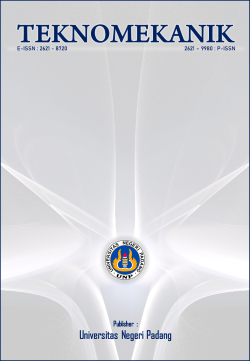Self-Efficacy as a predictor of entrepreneurial interest among university students: A quantitative study
DOI:
https://doi.org/10.24036/jptk.v8i2.44023Keywords:
self-efficacy, interest in entrepreneurship, quantitative analysis, psychological predictorsAbstract
Entrepreneurship is increasingly seen as an important strategy in reducing unemployment among college graduates and promoting economic resilience. This study aims to examine the predictive role of self-efficacy an individual's belief in their ability to complete a specific task in shaping entrepreneurial interest among university students. Self-efficacy is believed to influence how individuals perceive opportunities and challenges in starting a business, thereby playing a central role in entrepreneurial motivation. A descriptive quantitative approach was used in this study, with data collected through a structured questionnaire distributed to 348 students from nine faculties at the University of Padang. The questionnaire was designed using a Likert scale to measure levels of self-efficacy and interest in entrepreneurship. Data analysis was conducted using descriptive tests, normality, linearity, homogeneity, and hypothesis testing using Pearson's correlation. The results of the study showed a positive and significant relationship between self-efficacy and entrepreneurial interest (significance value= 0.012), with a Pearson correlation coefficient of 0.113, indicating a moderate relationship. Most students demonstrated relatively low levels of self-efficacy and interest in entrepreneurship, but students with high self-efficacy tended to have greater interest in entrepreneurship. These findings emphasize the importance of integrating self-confidence building into university entrepreneurship programs to enhance students' readiness and motivation to enter the entrepreneurial world after graduation.
Downloads
References
Agustina, R., Na’imah, N., Ridlo, W., & Sofiana, A. N. (2024). Strategies for Overcoming Unemployment among Freshgraduate. Jurnal Sosial Ekonomi Dan Humaniora, 10(4), 625–631. https://doi.org/10.29303/jseh.v10i4.615
Audretsch, D. B. (2007). The Entrepreneurial Society (1st ed.). Oxford University Press.
Bandura, A. (1997). Self-efficacy: The exercise of control. W.H. Freeman.
Chien-Chi, C., Sun, B., Yang, H., Zheng, M., & Li, B. (2020). Emotional Competence, Entrepreneurial Self-Efficacy, and Entrepreneurial Intention: A Study Based on China College Students’ Social Entrepreneurship Project. Frontiers in Psychology, 11. https://doi.org/10.3389/fpsyg.2020.547627
Chou, C.-C., Iamtrakul, P., Yoh, K., Miyata, M., & Doi, K. (2024). Determining the role of self-efficacy in sustained behavior change: An empirical study on intention to use community-based electric ride-sharing. Transportation Research Part A: Policy and Practice, 179, 103921. https://doi.org/10.1016/j.tra.2023.103921
Creswell, J. W., & Creswell, J. D. (2017). esearch design: Qualitative, quantitative, and mixed methods approaches (5th ed.). SAGE Publications.
Deliana, M. (2023). Self-Efficacy as A Factor of Entrepreneurial Intention. Journal of Education, Humaniora and Social Sciences (JEHSS), 5(4), 2573–2580. https://doi.org/10.34007/jehss.v5i4.1758
Doran, J., McCarthy, N., & O’Connor, M. (2018). The role of entrepreneurship in stimulating economic growth in developed and developing countries. Cogent Economics & Finance, 6(1), 1442093. https://doi.org/10.1080/23322039.2018.1442093
Etikan, I. (2017). Sampling and Sampling Methods. Biometrics & Biostatistics International Journal, 5(6). https://doi.org/10.15406/bbij.2017.05.00149
Fadzil, N. A. F. M., Jamaluddin, M. R., Rahman, F. B. A., & Loon, K. W. (2025). A Recent Systematic Review of Key Factors Influencing Students’ Entrepreneurial Intentions. International Journal of Social Science Research, 13(1), 169. https://doi.org/10.5296/ijssr.v13i1.22453
Ferreira-Neto, M. N., de Carvalho Castro, J. L., de Sousa-Filho, J. M., & de Souza Lessa, B. (2023). The role of self-efficacy, entrepreneurial passion, and creativity in developing entrepreneurial intentions. Frontiers in Psychology, 14. https://doi.org/10.3389/fpsyg.2023.1134618
McGee, J. E., Peterson, M., Mueller, S. L., & Sequeira, J. M. (2009). Entrepreneurial Self–Efficacy: Refining the Measure. Entrepreneurship Theory and Practice, 33(4), 965–988. https://doi.org/10.1111/j.1540-6520.2009.00304.x
Naudé, W. (2010). Entrepreneurship, developing countries, and development economics: new approaches and insights. Small Business Economics, 34(1), 1–12. https://doi.org/10.1007/s11187-009-9198-2
Ndofirepi, T. M. (2022). The Effect of Entrepreneurial Self-Efficacy and Entrepreneurial Self-Identity on Entrepreneurial Goal Intentions of Female and Male College Students in Zimbabwe. Administrative Sciences, 12(4), 180. https://doi.org/10.3390/admsci12040180
Patrisia, D., Abror, A., Doriza, S., & Maulida, E. (2019). The Entrepreneurial Attitudes of Higher Education Students. Proceedings of the 1st International Conference on Economics, Business, Entrepreneurship, and Finance (ICEBEF 2018). https://doi.org/10.2991/icebef-18.2019.123
Rodriguez, S., & Lieber, H. (2020). Relationship Between Entrepreneurship Education, Entrepreneurial Mindset, and Career Readiness in Secondary Students. Journal of Experiential Education, 43(3), 277–298. https://doi.org/10.1177/1053825920919462
Tavakol, M., & Dennick, R. (2011). Making sense of Cronbach’s alpha. International Journal of Medical Education, 2, 53–55. https://doi.org/10.5116/ijme.4dfb.8dfd
Wardana, L. W., Martha, J. A., Wati, A. P., Narmaditya, B. S., Setyawati, A., Maula, F. I., Mahendra, A. M., & Suparno. (2024). Does entrepreneurial self-efficacy really matter for entrepreneurial intention? Lesson from covid-19. Cogent Education, 11(1). https://doi.org/10.1080/2331186X.2024.2317231
Zhao, H., Seibert, S. E., & Hills, G. E. (2005). The Mediating Role of Self-Efficacy in the Development of Entrepreneurial Intentions. Journal of Applied Psychology, 90(6), 1265–1272. https://doi.org/10.1037/0021-9010.90.6.1265
Downloads
Published
Issue
Section
License
Copyright (c) 2025 Yusni Mulyani, Yaumal Arbi

This work is licensed under a Creative Commons Attribution 4.0 International License.





